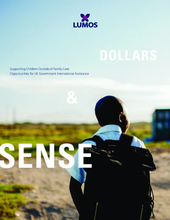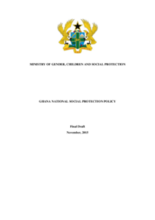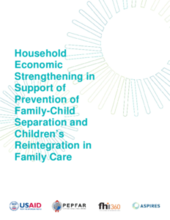Displaying 101 - 110 of 262
This blog post by UNICEF describes how the Disability Rights Initiative-Cambodia, a joint Australian Government-United Nations program to improve quality of life for children with disability and their families, is having an impact for one family in Cambodia.
To better understand the impact of donor funding, Lumos is conducting a five-part research study to examine the role of donors across a variety of sectors in propagating, supporting or ending the institutionalization of children. This report on US government funding is the first in the series.
On July 27–29, 2015, the Forum on Investing in Young Children Globally, in partnership with the Ethiopian Academy of Sciences, held a workshop in Addis Ababa, Ethiopia, to examine topics related to supporting family and community investments in young children globally.
The National Social Protection Policy of Ghana provides a framework for delivering social protection coherently, effectively and efficiently in a way that is holistic and properly targeted.
This is an evaluation document that promotes family-based care in Cambodia.
This webinar from Faith to Action Initiative presents key strategies for expanding the capacity of families to care for orphans and vulnerable children.
This study was designed to evaluate the effectiveness of a family-level economic strengthening intervention with regard to school attendance, school grades, and self-esteem in AIDS-orphaned adolescents aged 12-16 years from 10 public rural primary schools in southern Uganda.
This paper presents an overview of learning related to the prevention of family-child separation, the reintegration of children into family care, and economic interventions that support both.
This review is a systematic research synthesis of randomized impact evaluations of NGO-implemented interventions in low-income countries that work to build income and/or economic assets either of the caregiver, the household, or the individual child, adolescent, or youth, where the evaluation looked at any child-level or youth-level outcomes.
This article reports on the Western Uganda Bantwana Program, which worked with more than 1,000 HIV/AIDS-affected families with the goals of improving socioeconomic status, psychosocial functioning, and educational participation.




